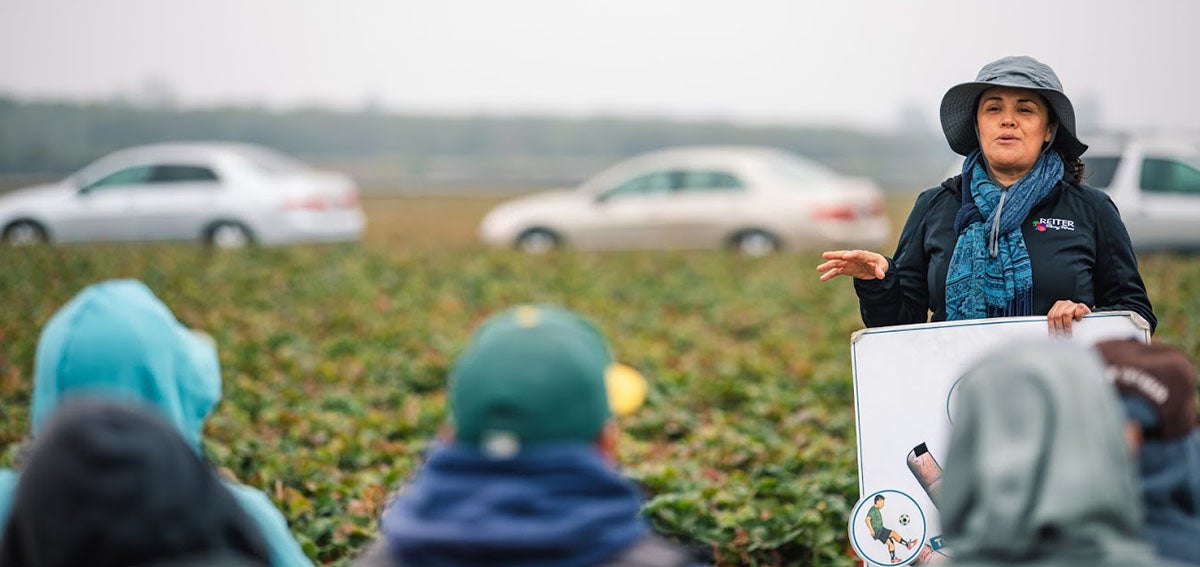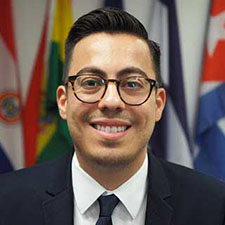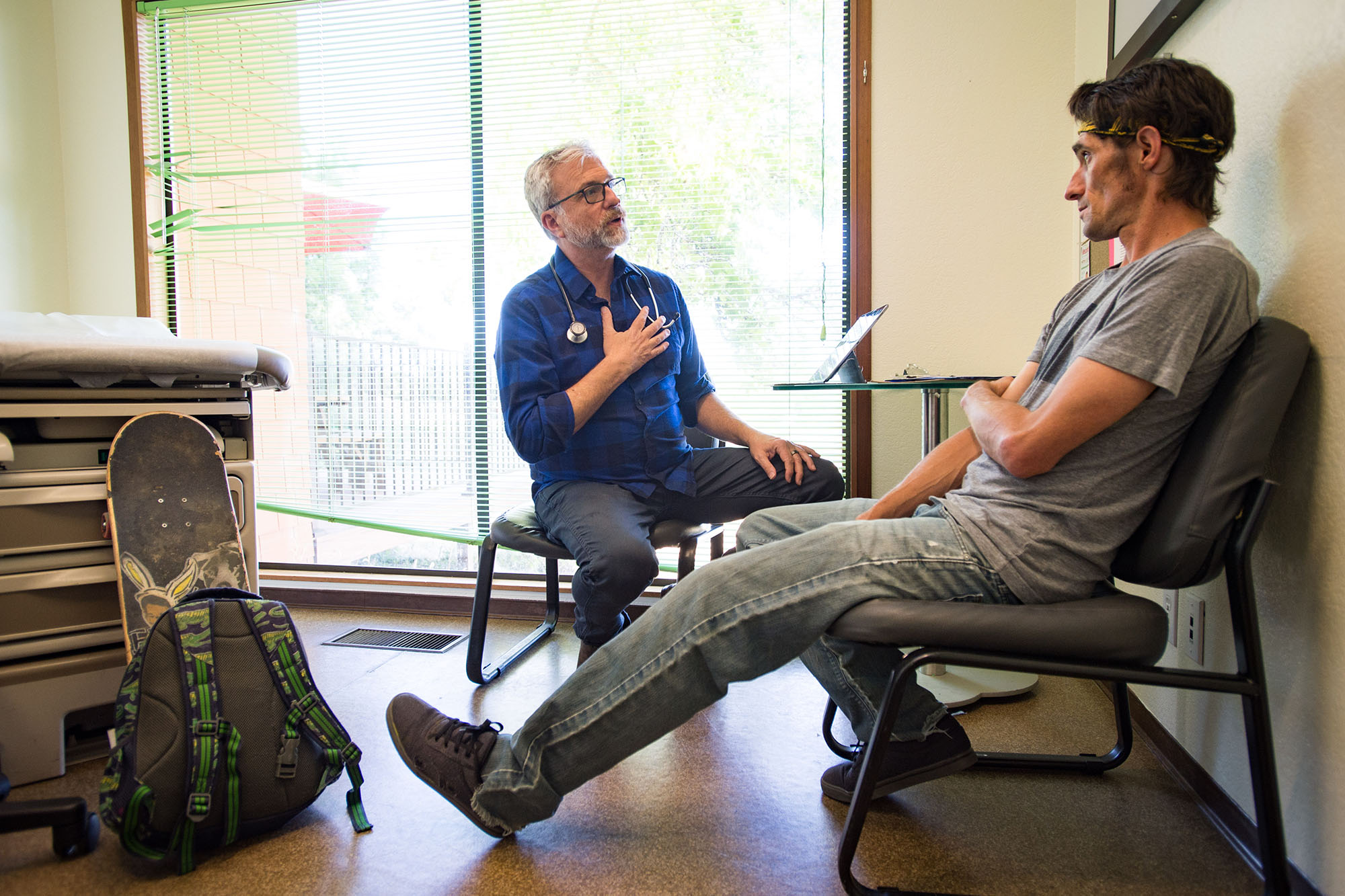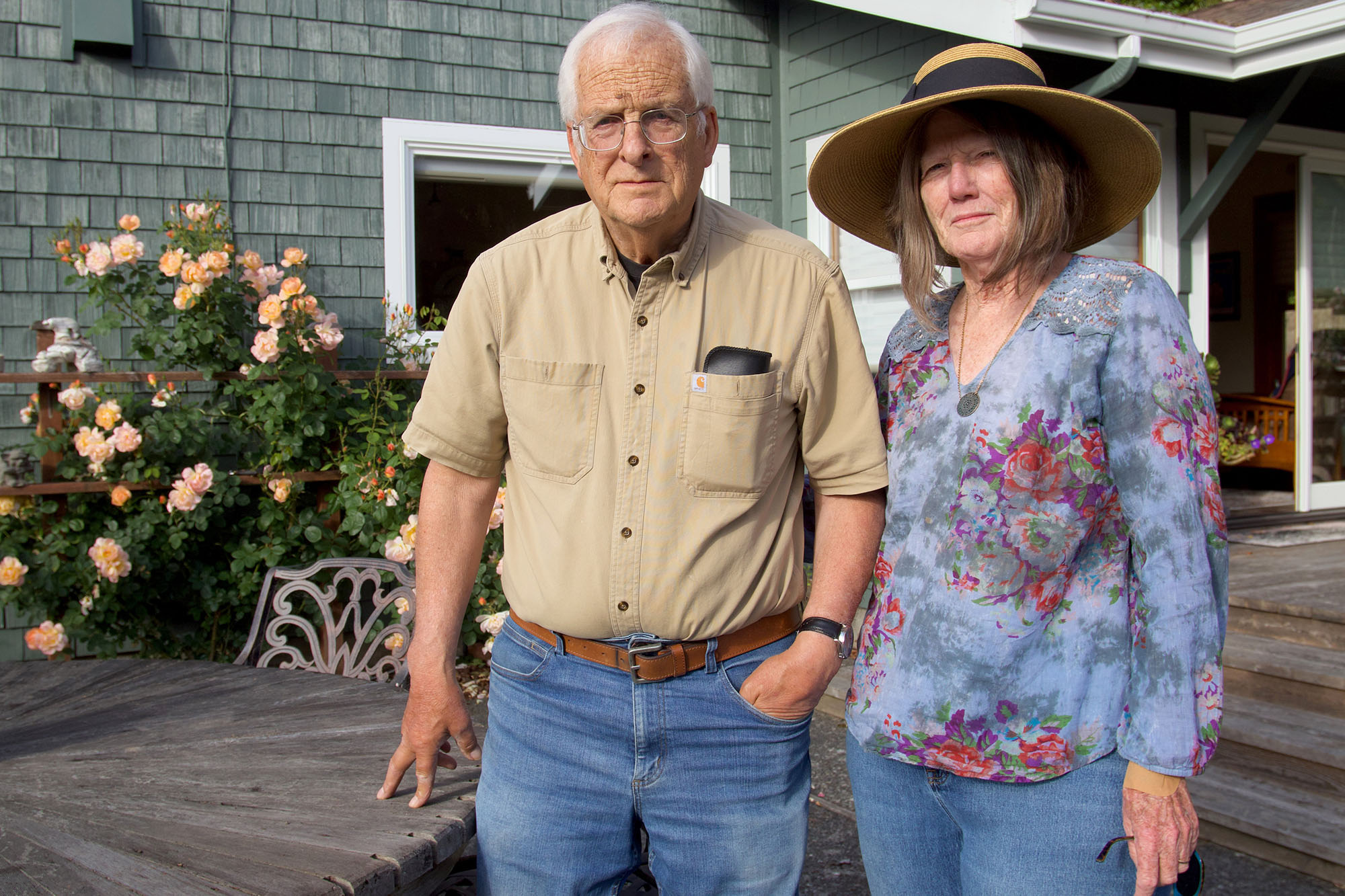
Picture yourself taking your vulnerable, elderly parents to a medical appointment conducted in a language they don’t speak. Imagine being at home with a child struggling to manage asthma symptoms triggered by something in your apartment building, or being on the phone with a doctor’s office seeking help for a family member battling depression or substance use. Remember how it felt during the COVID-19 lockdown, when you were unsure how to buy food or find masks or access information about vaccines?
Californians experience health challenges like these every day, and a growing number are learning they do not have to face them alone. Trained specialists with expertise in navigating the health care system — people who share the language, culture, and lived experience of the community they serve — are available across the state to provide support and bridge the gaps between the health system, social service programs, and home.
These are California’s community health workers and promotores — the frontline health workers who were the heroes of many communities during the pandemic — linking the most vulnerable among us to food, support, and connections to care in their time of greatest need.
Now it’s our turn to serve these essential workers. We are proud to announce the launch of a new initiative, the Community Health Workers and Promotores (CHW/P) Policy Coalition, a statewide group that is developing a policy agenda and public outreach campaign to support and expand this vital, often overlooked part of our health workforce.
Newfound Recognition
Partly because of hard lessons learned during the pandemic, our state’s leaders are demonstrating a newfound recognition of the contributions of community health workers and promotores. We have witnessed their years of hard work — especially on behalf of disadvantaged communities and people of color — on such issues as child health equity and community COVID-19 responses. This has increased public awareness of the unique, positive impact CHW/Ps have on health outcomes. Now, California has an opportunity to launch an era of sustainable, coordinated community health care that will be provided by diverse workers who come from and understand the communities they serve.
The first big step was taken this summer, when the federal government formally approved California’s request to add community health worker and promotores services as a covered benefit from Medi-Cal, the state’s Medicaid program. The Department of Health Care Services’ (DHCS) State Plan Amendment (PDF), which took effect July 1, outlines a range of preventive services offered by California’s nearly 7,000 CHW/Ps that may now be reimbursed by Medi-Cal. These services range from health education and referrals to individual screenings and patient advocacy.
Whether you’re a health care provider or a Medi-Cal enrollee, these covered services are available right now in your community. DHCS has developed an initial provider manual with details on program coverage and eligibility criteria, billing codes, claim submission processes, and more.
This is just the start. With California experiencing an ongoing shortage of health workers, this year’s state budget sets a goal of more than tripling the number of CHW/Ps. State leaders set aside $281 million to help recruit, train, and certify 25,000 new community health workers by 2025. While DHCS is overseeing the new Medi-Cal benefit, the state Department of Health Care Access and Information is developing a certification process for this next generation of community health workers.
Legislative Action
In September, Governor Gavin Newsom also signed an important bill, AB 2697, which will ensure that CHW/Ps remain actively engaged in shaping these efforts. The measure requires managed care plans to reach out to providers and beneficiaries to let them know the new Medi-Cal benefit is available, and it ensures DHCS will continue working with community members, CHW/Ps, and advocates as the benefit rolls out.
This is progress, and there is no denying CHW/Ps are enjoying a moment of unprecedented support. But much more remains to be done to make all of this a reality. Community health workers and promotores have operated for years outside of the traditional health care system — depending on contracts with community-based organizations and working without predictable schedules or steady wages. The annual median wage of a community health worker in California is about $53,000. For many workers, especially promotores, compensation can be limited to stipends and gift cards. This means many of these essential health workers and their families are themselves dependent on Medi-Cal.
Through the CHW/P Policy Coalition, our organizations and our partners, Transitions Clinic Network and Asian Pacific Islander Forward Movement, will bring a different set of skills and relationships to highlight the most effective ways to support and expand this dynamic workforce. Whether you work directly with community health workers and promotores or benefit from the services they provide, we hope you will join us in developing a policy agenda that will shift power to the community, elevate CHW/P voices, and ensure that integration of CHW/Ps into the California health care system is centered on the lived experience of workers and the people they serve.
CHW/Ps have long-standing relationships in their communities. As the state looks to expand their numbers and update the criteria for the services they can provide, it is essential that members of this diverse group are not unintentionally pushed out of their profession.
We welcome advocates, experts, and most important, frontline community health workers and promotores to work with us to apply the lessons communities have learned over the last few years. We want to help build a movement that will allow this vital workforce at the center of our community health system to continue supporting Californians who need their help for years to come.
More information on the CHW/P Policy Coalition is available here.
Authors & Contributors

Kiran Savage-Sangwan
Kiran Savage-Sangwan is executive director of the California Pan-Ethnic Health Network (CPEHN), a statewide, multicultural health policy organization. At CPEHN, Kiran previously served as health integration policy director and deputy director. She was the chief architect of many recent CPEHN bills in Sacramento, including the groundbreaking measure requiring hospitals to have a discharge plan in place before releasing poor and homeless people. The bill became law in 2018. Kiran also worked as director of legislation and advocacy for the National Alliance on Mental Illness California and as an organizer focused on immigrant rights for the American Civil Liberties Union of Northern California.

Mayra E. Alvarez
Mayra E. Alvarez, MHA, is President of The Children’s Partnership, a statewide advocacy organization working to advance child health equity through policy, research, and community engagement. She also serves as a commissioner on the California Mental Health Services Oversight and Accountability Commission and First 5 California Commission. Previously, she served at the US Department of Health and Human Services during the Obama-Biden administration, including at the Centers for Medicare and Medicaid Services, the Office of Minority Health, and the Office of Health Reform. Alvarez is from outside San Diego and is the proud daughter of Mexican immigrants.

Jeffrey Reynoso
Jeffrey Reynoso, DrPH, MPH, is the executive director of the Latino Coalition for a Healthy California, the state’s leading health policy organization advocating for health equity in the Latinx community. For more than a decade, he has worked on health equity and social justice issues at local, state, and national levels. Most recently, he was a doctoral fellow at Kaiser Permanente designing innovative programs to address food insecurity in the Southern California region. Dr. Reynoso holds a Doctor of Public Health from Harvard University, a Master of Public Health from UC Berkeley, and a bachelor of arts from UCLA.
He is a son of immigrants from Mexico and grew up in California’s Central Valley and North San Diego County. Growing up in a working-class immigrant family, Dr. Reynoso experienced firsthand the systemic barriers to equal opportunity for all, and he believes that the future health and economic success of California is tied to achieving health equity for the Latinx community.

Maria Lemus
Maria Lemus is the founding Executive Director of Visión y Compromiso and the Network of Promotoras and Community Health Workers. Under her guidance, Visión y Compromiso has become the lead organization in California providing support, capacity building, and leadership development for promotores, community health workers, and other community leaders. Since 2000, Lemus has provided the direction to grow this statewide organization into one that now represents over 4,000 community workers engaged in a diversity of community health programs in clinics, hospitals, public health and mental health departments, schools, and faith-based and community-based organizations in 15 regions of California and other states.
She represents the voice of promotores and community health workers on numerous state and national steering committees and coalitions such as the US Department of Health and Human Services Promotores Advisory Committee, Hispanic/Latino Workgroup of the National Diabetes Education Program, and the National Alliance for Latino Behavioral Health Workforce Development. The recipient of numerous awards including a California State Assembly Recognition Resolution, Lemus is a native Californian who makes her home in the San Francisco Bay Area.





